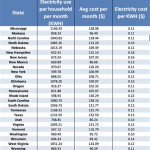How Much Is Renters Insurance For a One-Bedroom Apartment?
Renters insurance is a crucial safeguard for protecting personal belongings and providing liability coverage for tenants. Determining the cost of renters insurance for a one-bedroom apartment involves several factors, and understanding these elements can help individuals secure adequate coverage at a reasonable price. This article will delve into the average costs associated with renters insurance, the factors influencing premiums, and strategies for obtaining affordable coverage.
The primary function of renters insurance is to protect a tenant's personal property in the event of covered perils, such as fire, theft, vandalism, water damage (excluding floods and certain other water-related events), and windstorms. It also provides liability coverage, which can protect a tenant if someone is injured on the property and the tenant is found liable. Furthermore, many renters insurance policies include additional living expenses (ALE) coverage, which helps pay for temporary housing and other costs if the apartment becomes uninhabitable due to a covered loss.
While the cost of renters insurance is relatively low compared to other types of insurance, such as homeowners insurance or auto insurance, it's important to understand the various elements that contribute to the overall premium. Obtaining quotes from multiple insurance providers is essential to compare coverage options and find the best value.
Average Cost of Renters Insurance
The national average cost of renters insurance typically falls between $15 to $30 per month, translating to approximately $180 to $360 annually. However, this is a general estimate, and the actual cost for a one-bedroom apartment can vary significantly depending on several factors. These factors considered contribute to the insurance premiums and coverage.
For instance, a one-bedroom apartment in a high-crime area might command a higher premium compared to one situated in a safer, more secure neighborhood. Similarly, apartments with a high concentration of claims in the past may lead to increased insurance rates for all tenants. The chosen coverage limits and deductible also play a significant role in determining the monthly premium.
It is important to note the geographical location of the apartment greatly affects the average renter's insurance premiums. States with risks for natural disasters will likely see higher premiums. For example, states prone to hurricanes or earthquakes likely have higher insurance rates due to the risk involved. Cost of living in the state also plays a role in the pricing of renters insurance. States with higher cost of living may see higher insurance premiums.
While this average provides a general guideline, individuals should obtain personalized quotes from insurance providers to determine the specific cost of renters insurance for their one-bedroom apartment. Comparing quotes allows for a more precise assessment of the potential expenses and ensures that the coverage meets individual needs and circumstances.
Factors Influencing Renters Insurance Premiums
Several factors influence the cost of renters insurance, and understanding these elements can help tenants make informed decisions about their coverage.
Location: As previously mentioned, the location of the apartment is a significant determinant of renters insurance premiums. Areas with higher crime rates or a greater risk of natural disasters typically result in higher premiums. Insurance companies assess the potential for losses based on the historical data and perceived risks associated with a specific location.
Coverage Limits: The amount of coverage chosen directly impacts the premium. Higher coverage limits, which provide greater financial protection in the event of a loss, will generally result in higher monthly or annual premiums. Tenants need to assess the value of their personal property and determine the appropriate coverage level to adequately protect their belongings. Conducting a home inventory detailing possessions and their estimated value is a good process to assist one in making this decision.
Deductible: The deductible is the amount a tenant pays out-of-pocket before the insurance coverage kicks in. A higher deductible typically results in a lower premium, while a lower deductible leads to a higher premium. Tenants should carefully consider their financial situation and risk tolerance when choosing a deductible. Choosing a deductible that is too high might cause issues paying for the deductible during a claim, while choosing a deductible that is too low might cause higher monthly premiums.
Credit Score: In many states, insurance companies use credit scores as a factor in determining renters insurance premiums. Individuals with higher credit scores may be eligible for lower rates, while those with lower credit scores may face higher premiums. Maintaining a good credit history can therefore contribute to more affordable renters insurance.
Claims History: Past claims can impact the cost of renters insurance. Tenants with a history of filing claims may be considered higher risk by insurance companies, leading to increased premiums. It's important to weigh the potential benefits of filing a claim against the potential impact on future insurance rates.
Type of Coverage: There are two main types of personal property coverage: replacement cost value (RCV) and actual cash value (ACV). RCV coverage will reimburse the cost to replace an item with a brand-new, similar item, regardless of its age or condition. ACV coverage will reimburse the current value of an item with depreciation subtracted. RCV coverage generally has a higher premium, but provides much more value when making a claim. ACV coverage is cheaper, but will generally not provide nearly as much money when making a claim. Because of this, it is usually in the tenant's best interest to opt for RCV coverage.
Discounts: Many insurance companies offer discounts that can help lower renters insurance premiums. Some common discounts include bundling renters insurance with other policies (such as auto insurance), installing security systems or smoke detectors in the apartment, and being a member of certain professional organizations or alumni associations. Inquiring about available discounts can help tenants reduce the overall cost of their coverage.
Strategies for Obtaining Affordable Renters Insurance
Securing affordable renters insurance for a one-bedroom apartment requires careful planning and comparison shopping. The following strategies can help tenants find the best value for their insurance needs.
Compare Quotes: Obtaining quotes from multiple insurance providers is crucial for finding the most competitive rates. Online comparison tools and independent insurance agents can help tenants gather quotes from various companies. Be sure to compare the coverage limits, deductibles, and policy terms to ensure that they align with individual needs.
Increase Deductible: Opting for a higher deductible can lower the monthly premium. However, tenants should ensure that they can comfortably afford the deductible in the event of a claim. Finding a balance between affordability and financial preparedness is essential.
Bundle Policies: Bundling renters insurance with other insurance policies, such as auto insurance, can often result in significant discounts. Many insurance companies offer multi-policy discounts to encourage customers to consolidate their coverage.
Improve Security: Installing security systems, smoke detectors, and other safety features can demonstrate to insurance companies that the apartment is less prone to losses. Some insurers may offer discounts for enhancing the security of the property.
Maintain Good Credit: As mentioned earlier, credit scores can impact insurance premiums in many states. Maintaining a good credit history by paying bills on time and managing debt responsibly can lead to lower renters insurance rates.
Review Coverage Annually: It's essential to review renters insurance coverage annually to ensure that it still meets individual needs. As personal property and circumstances change, adjustments to coverage limits and deductibles may be necessary. Re-evaluating coverage each year can also help identify opportunities to lower premiums.
Ask About Available Discounts: Always inquire about potential discounts that may be available. Insurance companies often offer discounts for various factors, such as being a student, working in certain professions, or having a long-standing relationship with the insurer.
Choose the Right Coverage Amount: As previously mentioned, it is important to choose the right amount of coverage. While it might be tempting to choose a lower coverage amount to lower the monthly premiums for renters insurance, it might not be the best decision. Choosing the right coverage amount protects the tenant's belongings when there is a claim. Performing a home inventory can help determine the proper valuation of one's possessions.
Read the Policy Carefully: Be sure to read the policy carefully. Renters insurance policies can have many different exceptions and may not cover all possible events. It is important to know exactly what a policy covers before purchasing it. If there are any questions about the policy, be sure to call an insurance representative to get the answers to those questions. Understanding the fine print can help one make the best decision when it comes to choosing a renter's insurance policy.
By implementing these strategies, tenants can navigate the renters insurance market effectively and secure affordable coverage that adequately protects their personal property and provides liability protection.

Renter S Insurance Is Less Than Champion Apartments

Average Renters Insurance Cost For 2025 Forbes Advisor

Renters Insurance Quotes As Low 5 Month Liberty Mutual

How Much Is Renters Insurance Money
Renters Insurance Quotes Starting At 4 Month Allstate

How Much Is Renters Insurance For 100 000 In Coverage

Your Guide To Renters Insurance Coverage
Apartment Building Insurance What Kind Of Coverage Do You Need

Do You Need Renters Insurance In Westfield Harmony Apartment Homes

Renters Insurance Quotes Rental Apartment Aaa








